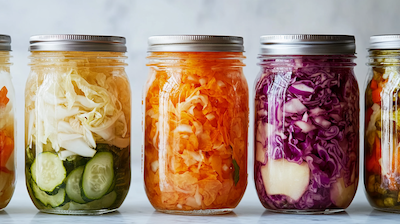Why Sauerkraut Matters for PCOS
Sauerkraut isn't just a tangy condiment - it's a powerful ally for managing PCOS symptoms. This fermented cabbage dish contains beneficial probiotics that support gut health, which is closely linked to hormonal balance and insulin resistance.
Characteristics of Quality Sauerkraut for PCOS
When choosing sauerkraut for PCOS management, look for these key features:
- Raw and unpasteurized to preserve beneficial bacteria
- No added sugars or preservatives
- Naturally fermented (not using vinegar)
- Stored in glass containers rather than plastic or metal
- Contains only cabbage, salt, and optional natural spices
Top Sauerkraut Options for PCOS
Here are the best types of sauerkraut to support your PCOS management:
1. Traditional Raw Sauerkraut
Simple, two-ingredient sauerkraut made with cabbage and salt offers the most straightforward benefits. It's particularly helpful for women dealing with gut health issues related to PCOS.
2. Caraway-Enhanced Sauerkraut
Caraway seeds add digestive benefits and can help reduce bloating, a common PCOS symptom. This variety is especially beneficial when paired with protein-rich meals.
3. Turmeric-Ginger Sauerkraut
This anti-inflammatory combination supports hormone balance and helps manage PCOS-related inflammation. Try our PCOS Gut Barrier Repair Soup with a side of this sauerkraut variety.
How to Include Sauerkraut in Your PCOS Diet
Incorporate sauerkraut into your meals thoughtfully:
- Start with 1-2 tablespoons daily to assess tolerance
- Serve alongside protein-rich dishes
- Add to salads for probiotic benefits
- Include in gut-healing bowls with other fermented foods
- Pair with bone broth for enhanced gut support
Making Your Own PCOS-Friendly Sauerkraut
Creating homemade sauerkraut gives you complete control over ingredients and fermentation. Follow these tips:
- Use organic cabbage when possible
- Maintain proper salt ratios (2-3% by weight)
- Ferment at room temperature for 1-4 weeks
- Store in glass containers in the refrigerator
- Monitor for proper fermentation signs
What to Avoid
When selecting sauerkraut for PCOS, avoid:
- Pasteurized varieties (heat-treated)
- Products with added sugars or preservatives
- Versions containing vinegar instead of natural fermentation
- Metal-canned sauerkraut
- Products with artificial ingredients
Timing Your Sauerkraut Consumption
For optimal benefits with PCOS:
- Consume with main meals to aid digestion
- Include it in your lunch to support afternoon energy levels
- Add to morning meals to kickstart digestion
- Consider it as a pre-meal appetizer
Storage and Shelf Life
Proper storage ensures maximum probiotic benefits:
- Keep refrigerated between 32-40°F (0-4°C)
- Use clean utensils to prevent contamination
- Consume within 4-6 months after opening
- Ensure the sauerkraut stays submerged in brine
Research and Evidence
This article was developed using peer-reviewed studies from PubMed Central and scientific journals focusing on fermented foods, probiotics, and PCOS management. Key sources include the Journal of Clinical Endocrinology & Metabolism and Frontiers in Endocrinology.
Additional research came from reviewing clinical guidelines on PCOS management and consulting expert recommendations on fermented food consumption for hormonal health.
Frequently Asked Questions About Sauerkraut and PCOS
Can sauerkraut help with PCOS weight management?
Yes, sauerkraut can support weight management in PCOS. The probiotics in sauerkraut help improve gut health and reduce inflammation, which may help regulate metabolism and support healthy weight management.
Additionally, it's a low-calorie food that can help you feel satisfied due to its fiber content.
How much sauerkraut should I eat daily for PCOS?
Start with 1-2 tablespoons daily and gradually increase to 1/4 cup per day as tolerated. Some women might need to start with even smaller amounts and build up slowly. Listen to your body and adjust portions based on your tolerance and digestive response.
Will store-bought sauerkraut provide the same benefits as homemade?
Store-bought sauerkraut can be beneficial if it's raw and unpasteurized. Look for refrigerated varieties rather than shelf-stable options. Check the ingredient list - it should only contain cabbage, salt, and possibly spices. Avoid products with preservatives or added vinegar.
Can sauerkraut interfere with PCOS medications?
Generally, sauerkraut doesn't interfere with common PCOS medications like metformin. However, if you're taking any medications or supplements, particularly those affecting digestion or blood sugar, consult your healthcare provider about including fermented foods in your diet.
I'm sensitive to histamines - can I still eat sauerkraut with PCOS?
Sauerkraut is high in histamines, which some people with PCOS may be sensitive to. If you have histamine intolerance, you might need to avoid or limit sauerkraut. Consider working with a healthcare provider to determine if it's appropriate for your specific situation.

Community Comments
Community Comments
Add a comment